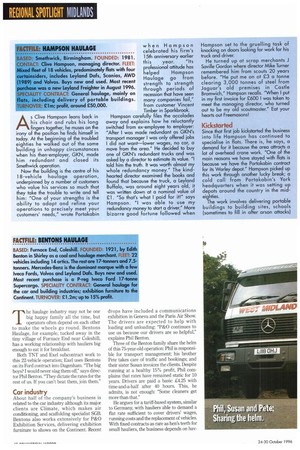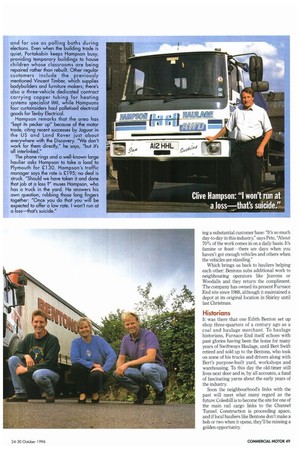A s Clive Hampson leans back in his chair and rubs
Page 50

Page 51

If you've noticed an error in this article please click here to report it so we can fix it.
his long fingers together, he muses on the irony of the position he finds himself in today. At the becinning of the troubled eighties he warced out of the same building in unhappy circumstances when his then-employer, GKN, made him redundant and closed its Smethwick operation.
Now the building is the centre of his 18-vehicle haulage operation, underpinned by a number of customers who value his services so much that they take the trouble to write and tell him: 'One of your strengths is the ability to adapt and refine your operations to precisely meet your customers' needs," wrote Portakabin when Hampson celebrated his firm's 15th anniversary earlier this year. "Its professional attitude has helped Hampson Haulage go from strength to strength through periods of recession that have seen many companies fail," from customer Vincent Timber in Sparkbrook.
Hampson carefully files the accolades away and explains how he reluctantly switched from ex-employee to employer: "After I was made redundant as GKN's transport manager I was only offered jobs I did not want—lower wages, no car, a move from the area." He decided to buy one of GKN's redundant trucks and was asked by a director to estimate its value. "I told him the truth. It was worth almost my whole redundancy money." The kindhearted director examined the books and found that because the truck, a Leyland Buffalo, was around eight years old, it was written down at a nominal value of £1, "So that's what I paid for it!" says Hampson. "I was able to use my redundancy money to start a driver." More bizarre good fortune followed when
Hampson set to the gruelling task of knocking on doors looking for work for his truck and driver.
He turned up at scrap merchants J Saville Gordon where director Mike Turner remembered him from scouts 20 years before. "He put me on at £3 a tonne clearing 3,000 tonnes of steel from Jaguar's old premises in Castle Bromwich," Hampson recalls. 'When I put in my first invoice for 2.600 I was taken to meet the managing director, who turned out to be my old scoutmaster' Eat your hearts out Freemasons!
Since that first job kickstarted the business into life Hampson has continued to specialise in flats. There is, he says, a demand for it because the area attracts a lot of overhead crane work. "One of the main reasons we have stayed with flats is because we have the Portakabin contract for its Warley depot." Hampson picked up this work through another lucky break; a cold call from Portakabin's York headquarters when it was setting up depots around the country in the mideighties.
The work involves delivering portable buildings to building sites, schools (sometimes to fill in after arson attacks) and for use as polling baths during elections. Even when the building trade is quiet, Portakcibin keeps Hampson busy, providing temporary buildings to house children whose classrooms are being repaired rather than rebuilt. Other regular customers include the previously mentioned Vincent Timber, which supplies bodybuilders and furniture makers; there's also a three-vehicle dedicated contract carrying copper tubing for heating systems specialist IMI, while Hampsons four curtainsiders haul palletised electrical goods for Tenby Electrical.
Hampson remarks that the area has "kept its pecker up" because of the motor trade, citing recent successes by Jaguar in the US and Land Rover just about everywhere with the Discovery. 'We don't work for them directly," he says, "but it's all interlinked."
The phone rings and a well-known large haulier asks Hampson to take a load to Plymouth for 2130. Hampson's traffic manager says the rate is 2195; no deal is struck, "Should we have taken it and done that job at a loss ?" muses Hampson, who has a truck in the yard. He answers his own question, rubbing those long fingers together: "Once you do that you will be expected to offer a low rate. I won't run at a loss—that's suicide."




















































































































